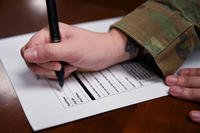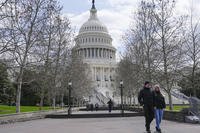Ordinarily I enjoy reading Military Update. However, I was more than a little dismayed at your column on sleep apnea and the comments by Michael Webster.
I have severe obstructive sleep apnea (OSA). I use a CPAP, including when I travel. I am dependent on it to sleep without interruption. I was diagnosed with OSA while on active duty, two to three years before I retired and well before I even knew that it was a VA disabling condition.
Sleep Apnea is not new. It's been described as early as the Roman era. What is new, dating from about 1981, is the CPAP. Even more recent is the recognition of the disease and its effects on human physiology including interrupted sleep, depression, increased in risk of a heart attack or stroke, and even an increase in cancer mortality rates.
Webster is appalled that veterans actually take full advantage of their benefits and (shudder) are briefed on those benefits. He paints a picture that anyone can stop in at the local sleep clinic for a night and automatically get a diagnosis and pick up a CPAP and 50 percent disability rating. Good luck with that. I've been through three sleep studies; they are not fun. You are literally wired for sound (and video). You either have sleep apnea events that are recorded, or you don't.
I take issue with any physician who states that use of a CPAP equates to not being disabled. I am tied to the machine every night. If the power goes out, it’s a problem.
If by using a CPAP I am no longer disabled then by that logic a lower extremity amputee with an advanced prosthetic is no longer disabled. After all, leg amputees with advanced prosthetics run marathons and some have successfully petitioned to remain on active duty. But takeaway the prosthetic, or in my case my CPAP, the disability is back.
As for Webster's claim that retired Air Force pilots are compensated by the VA and yet fly commercially -- so what? So do pilots with diabetes (if insulin is not required), high blood pressure, cancer and even depression. In each case, a special issuance is required for the medical certificate.
As to the physical being “rigorous?” Please, I spent several years as an airline pilot and took the “rigorous” physical for a Class I certificate every six months. It is anything but rigorous.
CHARLES GRIMES
Via email
Attorney Michael Webster is right to call sleep apnea claims a scam. Obstructive sleep apnea is a neurological disease involving malfunctioning brainstem neurons, of unknown cause, responsible for maintaining an open upper airway while asleep. It is a life-long condition, present at birth, of varying degrees of severity throughout one's lifetime, commonly undetected until later in life.
It is present when a member joins the service, remains undiagnosed until retirement when a sleep test is done for “disability determination.” The service member’s sleep apnea has gone untreated for his or her entire career and as just as prepare to leave the service, they have a sleep study. The study should have been done when they joined and received treatment with positive airway pressure (PAP) machine throughout their careers.
Untreated sleep apneics are a health risk for numerous medical complications including brain damage as well as accidents of every description from unavoidable micro-sleeping on the job. Untreated, a sleep apneic is a disaster waiting to happen. A successfully treated sleep apneic is no longer a risk. With treatment, there is no disability.
The wife of a fighter pilot told me her husband snored loudly and stopped breathing for prolonged intervals. I told her he should see his physician, have a sleep test and go on a CPAP machine. She said he won't do it because he'd be grounded if found to have sleep apnea.
The service has it backwards. It's the untreated serviceman who is a high risk. Treated, he should be at his best and good to go.
MACK D. JONES, MD
Fort Walton Beach, Fla.
I am a physician and also deal with soldiers receiving VA benefits.
Of course the 50 percent disability rating for sleep apnea is a scandal because, as reported, it is in most cases the result of obesity. It has always been a mystery how sleep apnea was first identified as a disability and how that disability was fixed at 50 percent.
Mr. Webster is correct that service members nearing retirement are counseled on disability retirement benefits available and VA publishes on its website detailed descriptions of disorders for which compensation is available. It is only human nature to take advantage of such lavish and perfectly legal benefits.
However, even more costly to VA and the taxpayer are the benefits going to Vietnam-era veterans for diseases that have been judged caused by Agent Orange. It started with a feel-good law, the Agent Orange Act of 1991, instructing VA to provide compensation for any disorder that could be “presumptively” linked to agent orange. It is generally agreed that certain uncommon disorders such as soft tissue sarcomas and some blood disorders are more common in veterans exposed to Agent Orange. There is now a long list of other conditions for which the evidence is “presumptive,” “suggestive but limited,” “possible” -- all phrases used by the Institute of Medicine in their periodic reports.
There is a paradox that currently retiring soldiers are having VA benefits almost forced on them while older veterans have been told that their diseases are not the result of age, obesity, smoking, drinking, substance abuse, dangerous life-styles…but of Agent Orange. They are aggrieved because so many of them endure extended waits and complex paperwork requirements to establish their claims.
Meanwhile, veterans with truly combat-related disorders are lumped in with those suffering from diabetes, high blood pressure, etc., and are in many cases in danger of receiving lower disability ratings than the automatic 50 percent for sleep apnea. It takes a lot of physical damage to reach a determination of 50 percent disability.
M. W., MD
Via email
Sleep Apnea is not a disability. It is a condition that is treatable with surgery, CPAP device or weight loss. It is common among the general population and individuals do not go on disability for it.
BEVERLY A. TAYLOR
Nashville, Tenn.
I’m an active duty Air Force colonel and an occupational medicine physician. You stated that some physicians feel that “if a CPAP provides relief, vets should no longer be viewed as disabled.” This is inconsistent with existing federal law. The Americans with Disabilities Act Amendments (ADAA) of 2008 prohibits consideration of mitigating measures such as medication, assistive technology, accommodations or modifications in determining whether a medical condition is considered a disability. In other words, treatment does not change whether a medical condition is considered disabling. There is one specific exception for ordinary eyeglasses.
Should veterans with sleep apnea be singled out with a uniquely stringent requirement in determining whether their medical condition constitutes a disability?
You mentioned that untreated sleep apnea can lead to serious complications such as heart attack and stroke. Studies show that treating sleep apnea can lower high blood pressure. What is less clear is whether treating sleep apnea actually prolongs life. It’s logical to assume treatment makes a difference, but I haven’t been able to find long-term outcome data that confirms it. There was a 2003 French study that said, “Mortality in obstructive sleep apnea patients treated with continuous positive airway pressure is near to that of the general population…” That is not entirely reassuring. Even if treatment stops the progression of related diseases, I don’t think anyone believes that treating sleep apnea will reverse the damage that was done between the onset of the disease and the time effective treatment began. That is often a number of years.
Obesity is a risk factor for sleep apnea but it’s not a simple cause-and-effect relationship. One of the worst sleep apnea cases I’ve seen was in an active duty Marine in his mid-20s. Even so, I agree that lifestyle contributes significantly to most cases of sleep apnea. So what? Heart disease, high blood pressure, type II diabetes, osteoarthritis, skin cancer, certain liver diseases, emphysema, and a host of other serious medical problems are often related to lifestyle, and are potentially disabling. Why should we exclude veterans with one lifestyle related illness and allow all of the others?
With the passage of the ADAA in 2008, Congress showed that it intended to treat disability very broadly. Some lawyers have said that under current law “everybody is disabled.” The wisdom of this approach is debatable but the current VA guidelines for sleep apnea seem to be in line with that intent.
As for Mr. Webster’s father, all I can say is “God bless him.” I hope he received compensation too. He earned it.
Sincerely yours,
MICHAEL L. BLEDSOE, MD, MS
Shalimar, Fla.
I was a clinic manager and an independent duty corpsman in VA while on active duty. I have written many consults for sleep studies. It seemed every person retiring wanted a sleep study. The Naval Hospital was so overwhelmed we had to start sending consults out to civilian clinics. On average about 40-50 percent of patients seen at the Naval Hospital were diagnosed with sleep apnea. On the other hand, 100 percent of the patients sent to civilian clinics where diagnosed with sleep apnea.
I brought my concerns up to my chain of command and was told there was nothing that could be done. I agree that this was, and still is, being abused. The sad part is the vets with combat-related injuries who are well below 50 percent, including myself.
I have no problem with my disability rating below 50 percent. I do have a problem with people getting 80-100 percent for conditions that have no possible correlation with military service.
Most of the persons I see with 50 percent and above have conditions directly related to personal choice. The military did not make them fat, give them diabetes or give them sleep apnea. If they had taken better care of themselves they would not have the conditions. I understand some of these conditions are genetic, but family history should also not be a reason for disability.
Solution: Make all personnel diagnosed with sleep apnea send a printout of their CPAP machine showing it is being used. Anyone who has a family history of diabetes, heart disease, etc. in their health records should not be eligible for disability. Not maintaining proper body weight and failing physical fitness should not be rewarded with compensation for a self-inflicted disease.
PAUL. H.
Chief Hospital Corpsman, USN-Ret.
Via email
I was a Physical Evaluations Board Liaison Officer (PEBLO) under contract working at Keesler Air Force Base from 2011-12 and assisted active duty personnel in filing claims when transitioning into civilian life, whether by normal military retirement after 20-plus years or medical discharge.
Sleep Apnea was just one of many big examples of the so-called 50 percent holy grail that troops strive for when filing for disability compensation. They will go 19 years without any sleep apnea-related issues or never have any duty days missed because of sleep apnea, and within year of retirement suddenly file for sleep apnea disability.
I witnessed firsthand young first-term airmen and career non-commissioned officers, and officers, looking to cash in on the added benefit, in addition pension, that a VA disability provide. One would think a person 50, 60, 80 percent disabled shouldn't be working a normal full 40-plus hour workweek.
The CPAP machine for sleep apnea has a sensor/monitor that can be checked to verify that a chronically ill member who relies on it is using it to sleep everyday. Yet this is not a requirement to prove some sort of consistent usage when filing for VA disability.
It saddens me that honor, integrity and service before self are character traits disregarded and dollars signs become all that matters to some at retirement.
I am retired and filed my own disability claim after 22 years active duty Air Force and only did what was required. I had a few minor injuries and surgeries but nothing chronic. I walked away with a 30 percent VA disability rating. Folks at VA and fellow comrades told me to put in for sleep apnea. I didn’t. Honor, integrity and service before self are values I hold in high regard. I had them before entering service. They were strengthened during service and I continue to carry them in my retirement years.
HUMBERTO RUIZ
Master Sergeant, USAF-Ret.
Via email
The Military Update column on sleep apnea disability payments astounds me. Thanks to Mr. Mike Webster and Tom Philpott for bringing this boondoggle to the public's attention.
I hope you will continue to press for reform so the $1 billion-plus going to veterans with non-disabling sleep disorders can be spent on amputees and other people with major combat-related conditions.
As a person who uses a CPAP machine to deal with my sleep apnea, I know firsthand that this is not a disability. Having your leg blown off is a disability. Suffering from PTSD so severe you cannot re-enter civilian life is a disability. Snapping a CPAP mask on your face at night is not a disability.
Please keep the spotlight on this issue until the money goes where it should.
JUDITH HAYNES
Gloucester, Va.
Letters may be edited for clarity or length. Write to Military Forum, P.O. Box 231111, Centreville, VA 20120-1111, send e-mail to militaryforum@aol.com or visit www.militaryupdate.com









